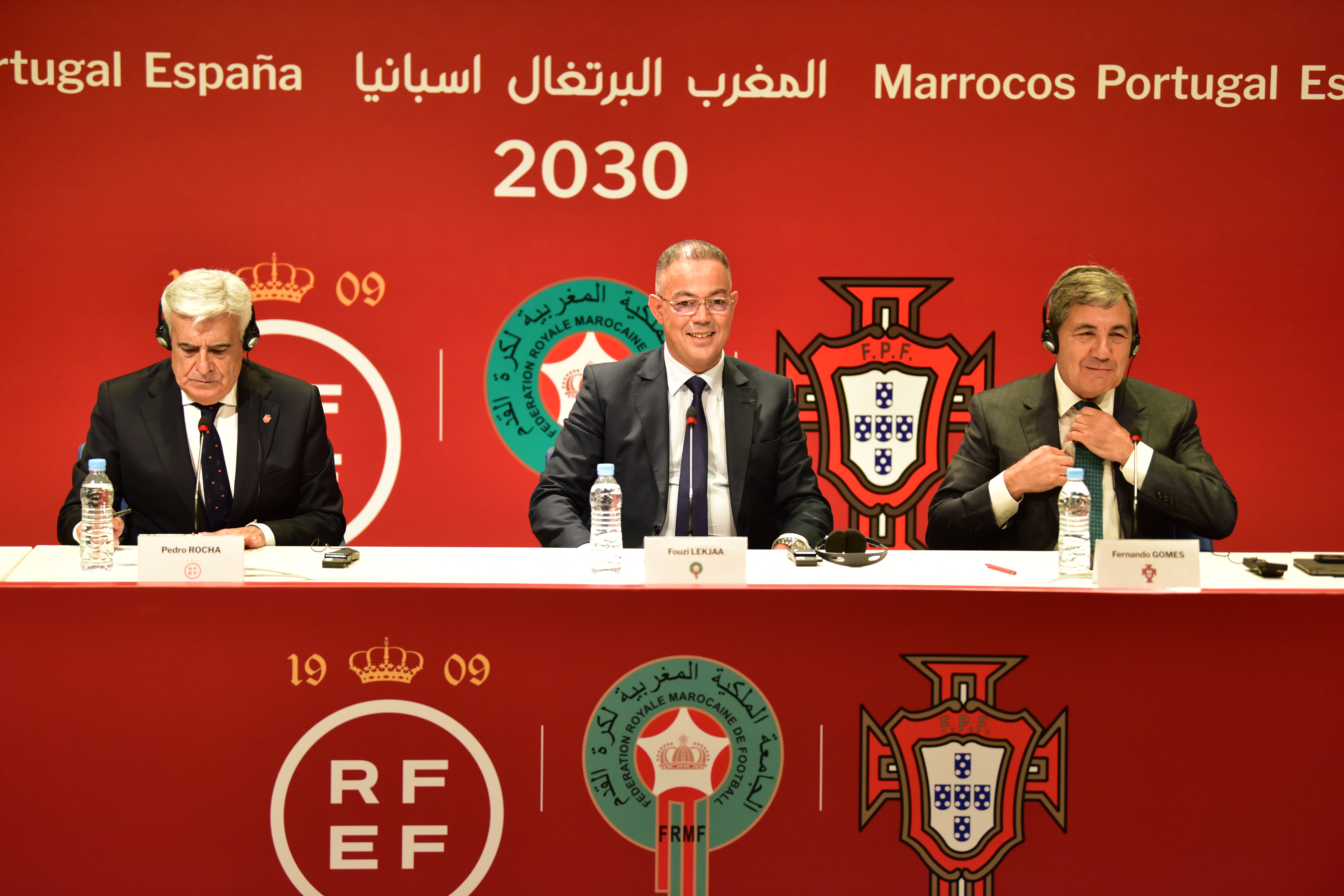By Paul Nicholson
October 29 – Having conducted a series of meetings in Portugal and Spain, the three joint bidding nations for the 2030 World Cup officially officially signed their letter confirming their interest to bid in Rabat. Morocco.
The Morocco, Portugal and Spain bid are the only candidates for 2030. While their appointment is virtually a shoo-in, there is nevertheless a lot of horse trading to be done on the way to organising the second of the 48-team World Cup formats.
Their bid will be the first to primarily be hosted between two confederations – Africa and Europe – and has the added complication that in its 100th year in 2030 (the first World Cup was played in Uruguay in 1930) it will open with three games in South America Argentina, Paraguay and Uruguay.
Branded as ‘Centenary Celebration Matches’, once these games have been played the remainder of the 2030 tournament moves to Spain, Portugal and Morocco.in Argentina.
Fouzi Lekjaa (pictured centre), president of the Royal Moroccan Football Federation, Fernando Gomes (right) president of the PortugueseFootball Federation and Pedro Rocha (left) president of the Royal Spanish Football Federation, were in Rabat to sing the letter with the message that their countries have “vibrant traditions and thousand years of intertwined cultures”.
They are promising an inclusive, innovative, and sustainable tournament, and of course the promise that they will grow – how much more growth is there realistically to be had for the sport that has dominated the world pretty much for the past 100 years?
Lekjaa, powerfully made the point of inclusion and shared goals, saying: “It is a World Cup that will help us furtherunite our common civilizations established more than ten centuries ago. The three countries share a common history, acommon present, and are looking forward towards a common future. All of this demonstrates, from both shores of theMediterranean, that collective success is possible and that prosperity can have a shared and collective perspective.”
The three bidders are promising a compact, accessible, and fan-focused tournament, which will benefit the whole football ecosystem. With increased focus worldwide on sustainability and carbon footprints, that looks like being a major challenge.
Without giving detail, Gomes part-addressed that issue saying: “2030 will be much more than the celebration of the past! Due to the ambition and competence of our three Federations, we believe this tournament will mark a paradigm shift in how major events are delivered in the future. That is our ambition!”
There was no detail given on the stadiums in the three countries to be included in the final bid, with the three presidents all holding the line that it is too premature at this stage to make any decisions and that technical teams and assessments of logistics were on-going.
For the moment it is about recognition of their unified approach and that they are serious. “This candidacy is a message of hope and unity because this World Cup will be a demonstration of uniting cultures, and the promotion of inclusion, diversity, and respect. It will be a World Cup with a significant social legacy that will remain in Morocco, Portugal, Spain – and around the world,” said Rocha.
Bumpy road ahead? And what about 2034?
From the moment the tournament was ‘pre-awarded’ to Morocco-Portugal-Spain by FIFA’s Council, the decision smacked of political convenience by a body that is happy to do – without open debate – what its executive and president tell it.
Prior to the announcement, Conmebol had been noisy about the centenary edition of the World Cup going to their continent, FIFA also desperately needed to do something positive for Africa rather than economically butcher its political and commercial development (the hallmark of its hands-on control of what has now become in football terms a Swiss colony), And, of course, it was Europe’s turn to host if the principle of rotation actually meant anything.
Conveniently ‘rotation’ did mean something as it enabled FIFA to direct that a bid for 2034 World Cup hosting could now only come from the Asian or Oceania region, and that a bid had better be made quick as the deadline for official confirmations of interest was end of the month.
That came with an aggressive round of politicking that has pretty much guaranteed Saudi Arabia will be the only bidder – a huge relief for FIFA and its president Gianni Infantino who will at last be able to deliver to his Saudi Arabian partners a major global presence in the game.
It will be the second time in four World Cups that an oil-fueled Gulf nation will have hosted the biggest sports event in the world. Saudi Arabia will be the first time that the 48-team format will be hosted in a single country – unless of course they suddenly find some pals to buddy up with on the hosting. But money buys a lot of pals. Qatar proved this and the Saudis have barrel loads more money than them.
The thing about money is that it doesn’t discriminate, but people do. The three bidders for 2030 are promising lasting social change globally. That could prove to be a high bar for the Saudis. Buying the dream and living the dream are two different things.
The Qataris bought the World Cup but they found that it didn’t buy unequivocal global appreciation. The Saudis have the same challenge, and 11 years to change world opinion. That, as the Qataris found, is a bigger game to win.
Contact the writer of this story at moc.l1751493133labto1751493133ofdlr1751493133owedi1751493133sni@n1751493133osloh1751493133cin.l1751493133uap1751493133

